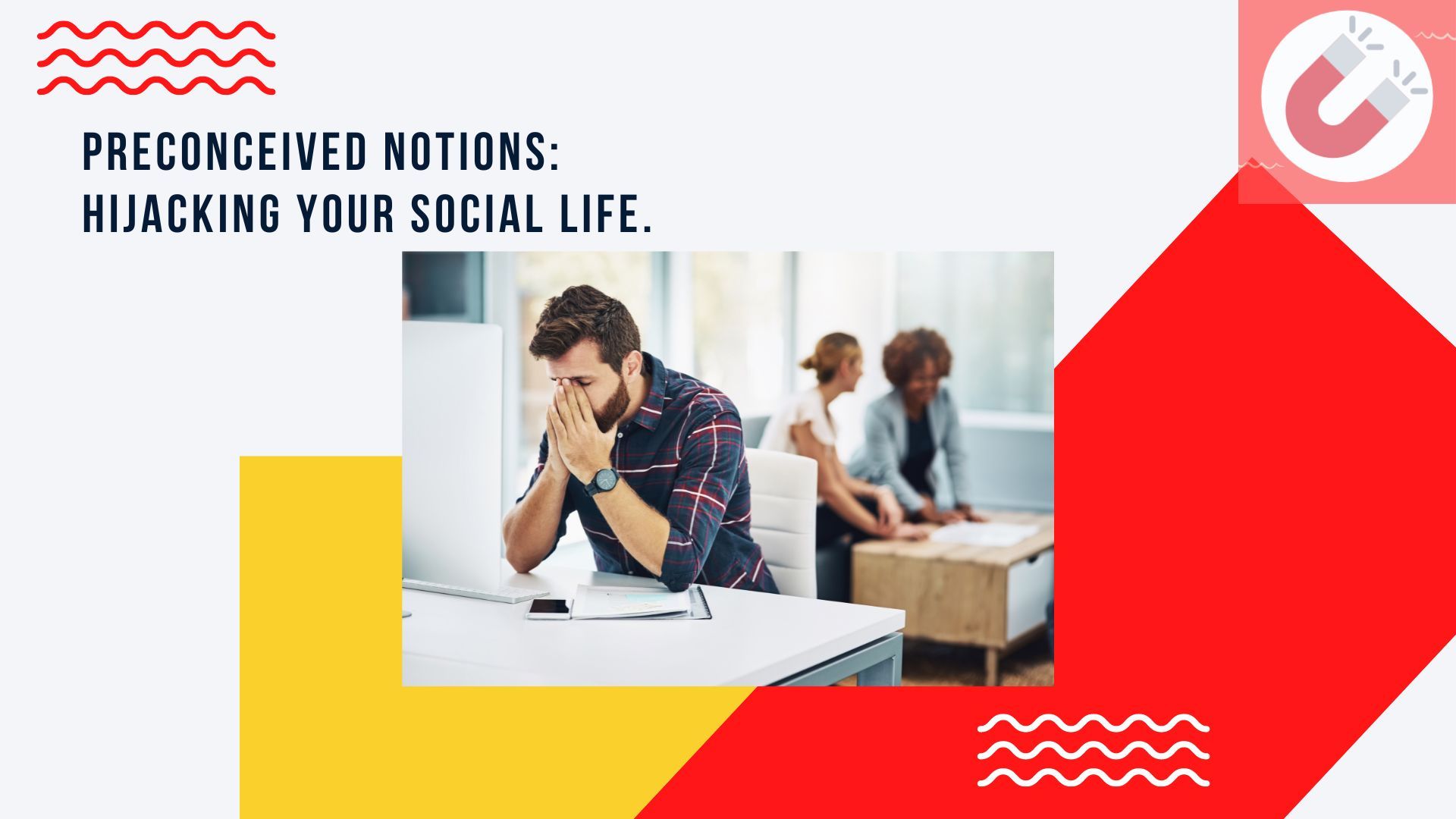What Is A Preconceived Notion?
A preconceived notion, also known as a preconception or unconscious bias, is a personal belief or idea about something that someone holds without proof. Preconceived notions can lead us to thinking we know what the outcome of a situation will be before it’s happened and without any real proof that it will happen.
They can be similar to a stereotype or prejudice in that it’s a simplified way of thinking that leads to a generalized belief about a person or thing that you may not be fully aware of or even realize you have. We all have them, and they’re usually based on our unexplored past experiences.
Without questioning them, these self limiting assumptions can often dictate how you see and react to the world around you, and they can have a negative impact on your life and hold you back from creating a social circle.
How Do Your Preconceptions Hold You Back?
Preconceptions can hold you back by causing you to see things in black-and-white terms. We may write people off or avoid situations because we’re afraid of what might happen, or because we think we already know what will happen. But in doing so, we miss out on experiences that could potentially improve our lives.
This black-and-white thinking can lead us to make decisions that we may later regret, or cause us to underestimate our own abilities and miss out on opportunities. We may convince ourselves that we’re not good enough, smart enough, or talented enough to achieve our goals.
Thinking this way can be particularly damaging, as it can prevent us from trying hard enough to achieve our goals, or set realistic goals in the first place. If they are not examined, preconceptions can hold you back from living your life to the fullest.
What Are Some Examples Of A Preconceived Notion?
Some examples of preconceived notions manifest against groups as stereotypes, unconscious bias, prejudice, sexism, or racism, but they can also be focussed intently on one individual, certain kinds of experiences, and even yourself as a form of self critisism.
Here are the top 5 examples of preconceptions that hijack people’s social lives.
1. I need to be born with good social skills
Many people have have the idea that social skills are something you’re either born with or you’re not – this is untrue. Social skills are just like any other skill – they can be learned and improved with practice. Just as you wouldn’t expect to pick up a musical instrument and play it perfectly the first time, you shouldn’t expect to have perfect social skills from the start. One of the best studies on this was done by Timothy Gallwey – he found that the more you practice a skill, the better you become at it.
This is good news for people who want to improve their social life because it means that with some effort, they can get better at interacting with others.
Some personality traits make it easier to socialize – people who are outgoing and extroverted tend to find it easier to meet new people and start conversations. Or people who are more agreeable and easygoing tend to get along better with others. But even people who don’t have these natural traits can improve their social skills by practicing and learning new techniques.
Examples: Anyone can learn how to open up and have good posture and body language. Nothing is stopping you from saying something witty or sarcastic like, “It’s a beautiful day!” in the middle of a terrible storm. Just play with saying opposites, it’s all learnable.
Many successful people in the spotlight admit to being shy or even weird. Johnny Depp bluntly admitted, “I’m f’n shy man.”
2. My disability stops me from having a good social life
It’s a common preconception that people with disabilities, especially those who suffer from autism spectrum disorder (ASD), social anxiety, a personality disorder, or ADHD cannot have a great social life. This could not be further from the truth. In fact, people with disabilities can and do have amazing social lives – it just takes a bit more effort on their part.
One of the main reasons why people with disabilities often struggle in social situations is that they are not given the opportunity to practice interacting with others. They may miss out on important developmental stages during childhood that other kids take for granted – things like playing games, talking on the phone or going to birthday parties. As a result, they may not know how to interact appropriately when they reach adulthood.
But this does not mean that people with disabilities are doomed to live lonely lives – in fact, there are many things they can do to improve their social skills. For starters, they can join disability support groups or chat rooms online where they can meet others who understand what they’re going through. They can also attend social events specifically for people with disabilities, which are often held in safe and supportive environments.
Many classes and websites offer resources for people with disabilities who want to learn more about social interactions. With a little effort, people with disabilities can have rich and fulfilling social lives.
Also, many people with mental health issues get the help they need and then find time to have great social lives that improve emotional stability.
3. I have to live in a big city to have a real social life
When it comes to having a great social life, you certainly don’t have to live in a big city. There are plenty of smaller towns and villages in the United States and all over world that offer just as much – if not more – when it comes to socializing and making friends as an adult.
For example, I currently live in a small town and I love it. There are always people around to chat with, and the sense of community is really strong. I’ve never felt isolated or alone here, and I’ve never had trouble finding things to do or people to hang out with.
In fact, I’ve met some of my best friends here. We all have different interests and backgrounds, but we get along great and love spending time together. We’ve gone on trips, attended events, and just hung out at each other’s houses – all without ever having to go into a big city.
If you’re looking for a great social life, don’t rule out smaller towns and villages. There are plenty of friendly people waiting to meet you, and you’ll never be bored with all the great things to do!
4. I need to already be popular or have a big network
It’s a big misconception that to have a great social life, you need to be popular or have a big network. This is simply not true – there are plenty of ways to make friends and create a network from scratch, even if you’re not already popular.
Take me for example. These days I’m a homebody, and I’ve never been one of the popular kids at school. I’ve always preferred spending time alone or with a small group of close friends, and I’ve slowly and constantly worked to improve at networking and making small talk. But this hasn’t stopped me from having a great social life.
I’ve met some of my best friends through mutual interests – we bonded over our love of philosophy, music, and exploring new places. We don’t always hang out in large groups; sometimes we’ll just meet up for coffee or go for a walk together. But even though our get-togethers are small, we always have a good time. I am fulfilled with 1 romantic partner and 4 best friends. That put together with work colleagues and family I’m more than socially fulfilled. Oh, and my dog Tova.
I’ve also gotten involved in several extracurricular social activities for adults that have allowed me to meet new people.
So don’t let the fear of not being popular stop you from having a great social life. There are plenty of ways to make friends and connect with others, regardless of your social skills or background. Just be open to trying new things and meeting new people, and you’ll be on your way to social success!
5. I’m weird
We are all weird! Living on this rock that is flying through space is weird. This is actually a superpower. Embrace your weirdness! When you do, people will be drawn to your light. Being different is what makes you special and unique. It’s what makes you interesting.
So instead of trying to fit in, stand out. Be yourself and don’t be afraid to show it. The more authentic you are, the more people will be drawn to you. And when you find others who appreciate your weirdness, you’ll be able to create strong, lasting friendships.
It is a faulty notion that there is a “normal”. Everyone is different and that is what makes life interesting. There is no one right way to do things, so embrace your uniqueness and you will be sure to find friends that appreciate you for who you are. When you find others who appreciate your uniqueness, you’ll have formed strong, lasting friendships.
Lady Gaga suffers from shyness. “I generally really keep to myself and I am focused on my music. But when I do meet people that I have lots in common with, it goes really well. I always feel shy in the Hollywood scene. I feel a bit like I did in high school, like I don’t really fit in.” And Lady Gaga is an inspiration and is loved by many people, especially her close circle.
Another thing to keep in mind is that there are plenty of ways to make friends and meet new people. Get involved in your weird extracurricular activities, go out into your weird community, or try some new “weird” activities or hobbies. When you put yourself out there, you’ll be surprised at how many people are also weird.
Spotting An Opinion Formed Without Adequate Evidence
When you’re trying to improve your life and reach your goals, it’s important to be aware of the things that might be holding you back. Of the many factors that may hold you back in life, your opinions are some of the few that are within your control – that is if you know how to spot them.
Here are four questions that can help you identify your own preconceived notions.
1. What are my automatic thoughts?
Automatic thoughts are the first things that come to mind when we’re faced with a new situation. They’re often based on our past experiences and beliefs, and they can dictate how we see and react to the world around us.
To identify your own automatic thoughts, pay attention to the thoughts that pop into your head when you’re faced with a new situation. Do you find yourself making assumptions or judgments about people or things without really knowing them?
2. What do I really believe?
Our beliefs often play a role in the automatic thoughts that we have. Beliefs are defined as “a feeling of certainty that something exists or is true”. We all have different beliefs, and they’re often based on our past experiences and values.
To identify your own beliefs, take a look at the things that you automatically assume to be true. Do you find yourself believing that all people of a certain group are bad? Or that you’re not good enough to achieve your goals?
3. What are my emotions?
Emotions can also play a role in the automatic thoughts that we have. Emotions are defined as “a natural instinctive state of mind deriving from one’s circumstances, mood, or relationships with others”. In other words, they’re our internal reaction to the world around us.
To identify your own emotions, pay attention to how you feel when you’re faced with a new situation. Do you find yourself feeling anxious or scared? Or maybe you feel angry or resentful?
4. What are my behaviors?
Our behaviors are often dictated by our automatic thoughts and emotions. They’re the things that we do in response to the world around us.
To identify your own behaviors, take a look at how you act when you’re faced with a new situation. Do you find yourself avoiding people or things that make you feel uncomfortable? Or maybe you find yourself lashing out in anger?
Breaking Your Preconceptions
Now that we’ve explored some of the ways that preconceptions can impact and hinder our lives, let’s take a look at some of the things we can do and questions we can ask ourselves to effectively break preconceptions.
Here are three tips to remember that can help you change your own self limiting beliefs:
1. Become aware of your thoughts and emotions.
Pay attention to the things that you automatically think and feel when you’re faced with a new situation. Once you’re aware of your thoughts and emotions, you can start to question them.
2. Challenge your beliefs.
Take a look at the things that you automatically assume to be true. Are they really true? Or are they just your beliefs?
3. Change your behavior.
How do you act when you’re faced with a new situation? Are you closed off to new experiences based on something from the past? Does venturing into uncharted social territory make you feel anxious or scared?
Don’t Set Limits Your Own Potential
Preconceived notions are persistent ideas or beliefs that we hold onto without any evidence and even when evidence proves them to be false.
These are biases that can prevent us from seeing the world objectively and they make it difficult for us to open our minds to new people, experiences, ideas, or perspectives.
If you find that your preconceptions are holding you back in life, it’s time to question them and make a change.
To break your preconceptions, start by becoming aware of your thoughts and emotions. Then, challenge your beliefs. Finally, change your behavior.
With time and effort (and social skills training), you can learn to break your preconceptions and live the life you want.



